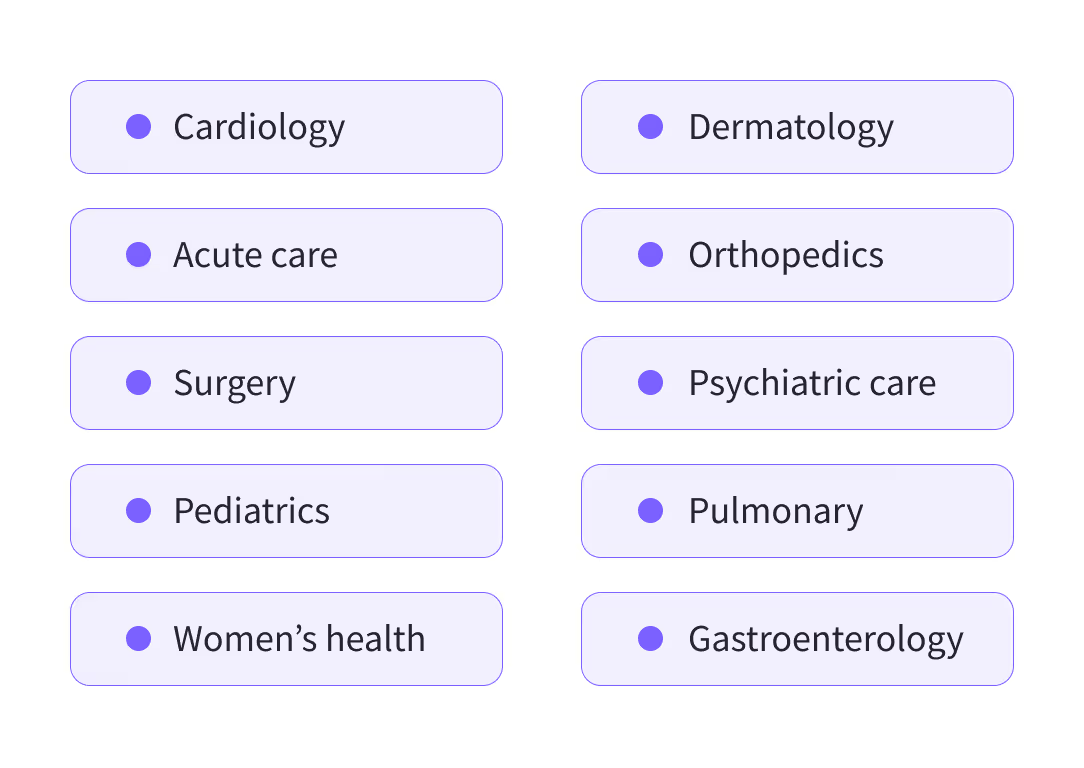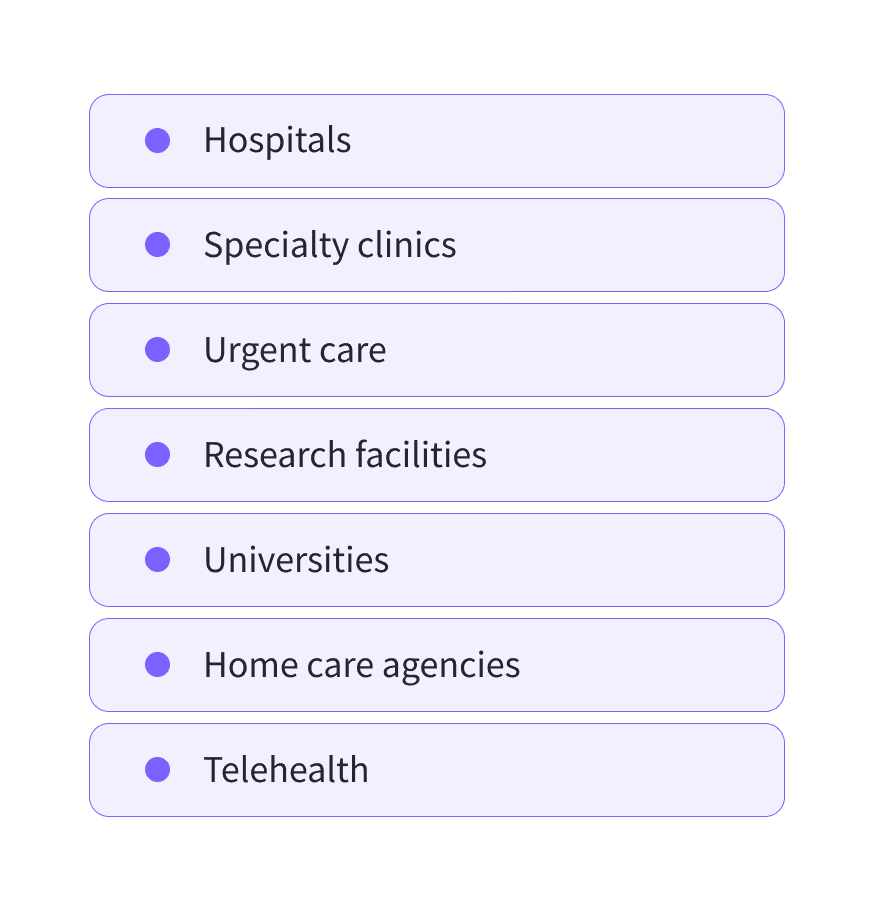TL;DR – 7 Reasons Why Choosing a Nurse Practitioner Career is a Good Choice
- Autonomy and full practice authority — In many states, NPs can diagnose, treat, and prescribe independently, giving them a high level of professional control and impact.
- Specialty flexibility — From mental health to pediatrics to acute care, NPs can tailor their careers to their passions and patient populations.
- Entrepreneurial opportunities — Nurse practitioners can open their own practices in FPA states, offering personalized care and business ownership.
- Job satisfaction meets solid pay — With an average salary of $127K+, growing demand, and diverse practice settings, NPs enjoy both fulfillment and financial security.
- A future-proof profession — NP jobs are projected to grow 40% by 2028, making this one of the fastest-growing and most in-demand roles in healthcare.
Rest assured, you're not alone. Many students pursuing a nurse practitioner career experience periods of uncertainty. However, as the healthcare landscape evolves, nurse practitioners are becoming increasingly vital in expanding access to quality primary and preventive care across America.
Whether you're immersed in your nurse practitioner program or approaching graduation, it's important to remember the value of your chosen path. Let's explore seven compelling reasons why embarking on a career as a nurse practitioner is an excellent decision for healthcare professionals like you.
Introduction: What is a Nurse Practitioner?
A nurse practitioner (NP) is a highly trained healthcare professional who plays a crucial role in providing both primary and specialty care to patients. As advanced practice registered nurses (APRNs), NPs have completed rigorous graduate-level education and training in nursing, equipping them with the skills to diagnose and treat patients, prescribe medications, and offer preventive care. Unlike registered nurses, who primarily provide bedside care, nurse practitioners have the authority to manage patient care independently.
Nurse practitioners work in a variety of settings, including hospitals, clinics, private practices, and community health organizations. Their extensive training allows them to cater to diverse patient populations, making them invaluable assets in the healthcare system. Whether they are treating patients in a bustling urban hospital or a rural community clinic, NPs are dedicated to improving health outcomes and expanding access to quality care.
1. Full Practice Authority: Expanding the Scope of Nursing Practice
As of 2023, NPs can prescribe without physician supervision in 27 states, thanks to Full Practice Authority (FPA). This landmark development in advanced practice nursing significantly expands the role of NPs in primary and preventive healthcare settings.
FPA empowers nurse practitioners to:
- Evaluate and diagnose patients independently
- Order and interpret diagnostic tests
- Initiate and manage treatment plans
- Prescribe medications and other therapies
This level of autonomy appeals to many healthcare professionals, offering a sense of ownership over patient care and outcomes. It allows NPs to fully utilize their graduate nursing education and clinical experience, bridging gaps in the healthcare system and improving access to quality care.
For aspiring nurse practitioners, FPA represents an opportunity to practice at the full extent of their training, particularly in underserved areas where primary care providers are scarce. This expanded scope of practice not only enhances career satisfaction but also contributes significantly to community health.
As the healthcare landscape evolves, more states are recognizing the vital role of nurse practitioners in addressing primary healthcare needs. This trend towards FPA is reshaping the nurse practitioner career path, opening new doors for professional growth and patient care excellence.
2. Diverse Specialty Opportunities
While many associate nurse practitioners with primary care or general hospital settings, the scope of an NP career extends far beyond these traditional roles. Advanced practice registered nurses have the opportunity to specialize in various fields, catering to different patient populations and healthcare needs.
Nurse practitioners can pursue specialized roles such as:

These specializations allow NPs to focus their expertise on specific areas of healthcare, from pediatric health to women's health and from mental health to acute care. By choosing a specialty, nurse practitioners can tailor their careers to align with their passions and interests within the healthcare field.
Each specialty requires additional training and often involves obtaining national board certification. This advanced education and certification process ensures that nurse practitioners are well-equipped to provide high-quality, specialized care to their patients.
The ability to specialize not only enhances job satisfaction but also opens up diverse career opportunities in various healthcare settings, including community health centers, private practices, and specialized clinics. This versatility in career paths is one of the many reasons why becoming a nurse practitioner is an attractive option for those looking to advance their nursing career.
3. Opportunity for Entrepreneurship
For nurse practitioners with an entrepreneurial spirit, the path to becoming a healthcare provider extends beyond traditional employment. In states with full practice authority, NPs have the exciting opportunity to establish their own private practices, offering a unique blend of nursing expertise and business acumen.
This entrepreneurial route allows advanced practice registered nurses to:
- Develop their own primary care services tailored to specific patient populations
- Create innovative healthcare delivery models
- Address gaps in local healthcare systems, particularly in underserved areas
- Implement personalized approaches to patient care and health education
Starting a private practice as a nurse practitioner enables you to shape your own healthcare setting, from a family-focused clinic to a specialized women's health center. This autonomy allows you to directly influence how you treat patients, manage medical records, and implement treatment plans.
4. Unparalleled Personal and Professional Fulfillment
The nurse practitioner career offers a unique blend of clinical expertise and patient-centered care, leading to profound personal and professional satisfaction. It's no coincidence that nurse practitioners consistently rank at the top of the U.S. News & World Report's list of best healthcare jobs.
This high level of job satisfaction stems from several factors:
- Holistic Patient Care: Nurse practitioners have the opportunity to treat patients comprehensively, addressing not just immediate health concerns but also focusing on disease prevention and health promotion.
- Meaningful Relationships: The NP's approach to care fosters deep, long-term connections with patients and their families. This continuity of care allows for a more nuanced understanding of each patient's health journey.
- Impactful Work: Whether in primary care, acute care, or specialized settings, NPs play a crucial role in improving health outcomes and educating patients about their health.
- Professional Growth: The ongoing learning and skill development inherent in nursing practice keeps the career intellectually stimulating and rewarding.
Moreover, the ability to specialize in areas like women's health, pediatric health, or mental health allows nurse practitioners to align their careers with their personal passions. This alignment of professional duties with personal interests further enhances job satisfaction.
5. Versatile Practice Settings
The extensive training and broad skill set of nurse practitioners open doors to various healthcare settings, allowing NPs to cater to diverse patient populations throughout their lifespan. This versatility enhances career opportunities and contributes to the overall job satisfaction we previously discussed.
Their extensive training ensures they can work in a variety of settings, including:

This array of settings allows nurse practitioners to align their work environment with their personal interests and preferred patient populations. For instance, an NP passionate about women's health might choose to work in a specialized clinic. At the same time, another interested in treating patients across the lifespan might opt for a family practice or community health center.
Moreover, the flexibility to transition between these settings throughout one's career adds another layer of appeal to the nurse practitioner profession. This mobility allows NPs to gain diverse clinical experience, continually learn new skills, and adapt their career path as their interests evolve.
6. Competitive Compensation and Growth Potential
While the personal fulfillment of treating patients and improving health outcomes is a significant draw for many nurse practitioners, the financial aspects of the career are equally attractive. The compensation for NPs reflects their advanced practice status and the critical role they play in the healthcare system.
According to recent data, nurse practitioners in the United States earn competitive salaries that recognize their expertise and responsibilities:
- Average annual salary: $127,467
- Salary range: $89,585 (Low) to $181,370 (High)
- Additional overtime compensation: $18,750 per year on average
These figures underscore the value placed on nurse practitioners' advanced skills and graduate nursing education. However, it's important to note that actual earnings can vary based on several factors:
- Geographic location: Urban areas or regions with high demand for healthcare professionals may offer higher salaries.
- Specialty: Certain specializations, such as psychiatric-mental health or acute care, may command higher wages.
- Practice setting: Salaries can differ between hospitals, private practices, and community health centers.
- Years of experience: As with many professions, experienced NPs often earn more.
For those nurse practitioners who choose to pursue entrepreneurial paths, such as opening their own practices in states with full practice authority, the potential for financial growth can be even greater.
This competitive compensation, coupled with job security in a growing field, allows nurse practitioners to focus on what matters most: providing high-quality primary and preventive care to their patients and communities while enjoying a comfortable lifestyle.
7. Career Outlook
The future for nurse practitioners is exceptionally bright, with projections indicating substantial growth and increasing demand across the healthcare sector. This positive outlook not only ensures job security but also reinforces the vital role of NPs in addressing the evolving healthcare needs of our population.
Key statistics highlighting the promising career outlook include:
- Nurse practitioner field will grow by 40% from 2018 to 2028.
- Approximately 118,600 new jobs are anticipated in the next decade.
- Nurse practitioner salaries increased by 11% in the past five years.
- Over 213,500 nurse practitioners are employed in the U.S.
- 27,912 nurse practitioner job openings exist in the U.S. now.
For aspiring nurse practitioners, this positive career outlook means not just job security, but also the potential for diverse career paths. Whether you're interested in primary care, acute care, or specialized fields like women's health or mental health, the growing demand ensures opportunities across various healthcare settings.
Moreover, this growth trajectory suggests that nurse practitioners will continue to play an increasingly central role in shaping the future of healthcare delivery. As the profession expands, NPs will have more opportunities to influence health policy, lead healthcare teams, and drive innovations in patient care.
Conclusion
As we've explored, the nurse practitioner career offers a unique combination of professional growth, personal fulfillment, and societal impact. From the autonomy granted by full practice authority to the diverse specialization opportunities, NPs are well-positioned to shape the future of healthcare delivery.
The robust job outlook, competitive compensation, and variety of practice settings underscore the value placed on nurse practitioners in our evolving healthcare landscape. Whether you're drawn to primary care, acute care, or specialized fields, the NP path offers a chance to make a meaningful difference in patients' lives while advancing your own professional aspirations.
To aspiring nurse practitioners: your choice to pursue this career is both timely and admirable. As you embark on this journey, remember that your expertise and compassion will contribute significantly to improving healthcare access and outcomes across diverse communities.
Embrace your future role with confidence, knowing that as a nurse practitioner, you'll be at the forefront of patient-centered care, driving positive change in the healthcare system, and touching countless lives along the way.
Key Definitions - The Essential Guide to a Successful Nurse Practitioner Career
Nurse Practitioner (NP):
An advanced nurse with graduate-level training who can diagnose, treat, and manage patient care.
Advanced Practice Registered Nurse (APRN):
An umbrella term for nurses with advanced education, including nurse practitioners.
Full Practice Authority (FPA):
State-level permission that allows NPs to practice independently without physician supervision.
Primary Care:
Ongoing, comprehensive care focused on prevention, chronic conditions, and overall health.
Acute Care:
Fast-paced medical care for severe, sudden, or complex health conditions, often in hospitals.
Specialty Certification:
National board certification that allows NPs to practice in a focused area like pediatrics or mental health.
Graduate Nursing Education:
Master’s (MSN) or doctoral (DNP) education required to become a nurse practitioner.
Scope of Practice:
What an NP is legally allowed to do, which varies by state and authority level.
Preventive Care:
Healthcare focused on preventing illness through screenings, education, and early intervention.
Private Practice:
A healthcare clinic owned and operated by a provider, common for NPs in FPA states.
Patient Population:
The group of people an NP primarily serves, such as children, adults, or women.
Advanced Clinical Training:
Hands-on education that prepares NPs to assess, diagnose, and manage patient care independently.
Healthcare Access:
The ability for patients to receive timely, affordable medical care, an area where NPs play a major role.
FAQs: Common Questions About Choosing a Nurse Practitioner Career
Is becoming a nurse practitioner worth it long-term?
Yes. NPs benefit from strong job demand, flexibility, and the ability to grow into different roles over time.
Do nurse practitioners really work independently?
In many states, yes. Full Practice Authority allows NPs to diagnose, treat, and prescribe on their own.
How long does it take to become an NP?
Most programs take 2–4 years after earning a BSN, depending on degree type and pace.
Can I change specialties later in my NP career?
Yes, though it often requires additional certification or clinical training.
Which NP specialties are most in demand?
Primary care, psychiatric mental health, acute care, and women’s health continue to grow rapidly.
Is the salary stable across specialties?
Compensation varies by specialty, setting, and location, but overall earning potential is strong.
Can nurse practitioners open their own practice?
Yes, in Full Practice Authority states, many NPs own and operate private practices.
What if I want work-life balance?
NP roles offer flexibility across settings like clinics, telehealth, and community care.
Is NP school manageable with work and family?
Challenging, yes, but many programs are designed for working nurses with flexible formats.
What makes NPs so important in healthcare today?
They expand access to care, especially in underserved areas, and provide high-quality, patient-centered care.
About the author
- NPHub Staff
At NPHub, we live and breathe clinical placements. Our team is made up of nurse practitioners, clinical coordinators, placement advisors, and former students who’ve been through the process themselves. We work directly with NP students across the country to help them secure high-quality preceptorships and graduate on time with confidence. - Last updated
February 5th.2025 - Fact-checked by
NPHub Clinical Placement Experts & Student Support Team - Sources and references
- https://www.nphub.com/blog/5-ways-nurse-practitioners-improve-access-to-care
- https://aanp.org/advocacy/state/state-practice-environment
- https://www.nphub.com/blog/why-nurse-practitioners-should-practice-independently
- https://www.nphub.com/blog/launch-np-private-practice-guide
- https://money.usnews.com/careers/best-jobs/nurse-practitioner
Find a preceptor who cares with NPHub
Book a rotation.webp)








.webp)


.webp)



%20(3)%20(2).svg)
.webp)